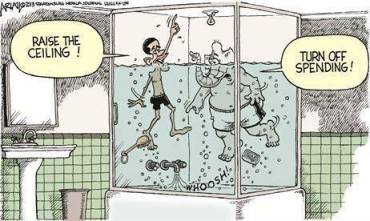Let’s Talk About the Perilous National Debt that No One Wants to Talk About
In 2006, the junior U.S. Senator from Illinois predicted that “over the next 5 years, between now and 2011, the President’s budget will increase the debt by almost another $3.5 trillion,” from $10.6 trillion to $14.1 trillion. Criticizing the incumbent president, George W. Bush, then-Senator Barack Obama said, “. . . raising America’s debt limit is a sign of leadership failure.”
In October 2015, Pr esident Barack Obama signed into law a bill to raise the debt limit to add to the $19.17 trillion debt and signed a budget that predicts a deficit of $474 billion, a significant drop from previous years of trillion-dollar deficits under Mr. Obama’s supposed “leadership failure.”
esident Barack Obama signed into law a bill to raise the debt limit to add to the $19.17 trillion debt and signed a budget that predicts a deficit of $474 billion, a significant drop from previous years of trillion-dollar deficits under Mr. Obama’s supposed “leadership failure.”
 esident Barack Obama signed into law a bill to raise the debt limit to add to the $19.17 trillion debt and signed a budget that predicts a deficit of $474 billion, a significant drop from previous years of trillion-dollar deficits under Mr. Obama’s supposed “leadership failure.”
esident Barack Obama signed into law a bill to raise the debt limit to add to the $19.17 trillion debt and signed a budget that predicts a deficit of $474 billion, a significant drop from previous years of trillion-dollar deficits under Mr. Obama’s supposed “leadership failure.”The deficits 2002 — 2008 under President Bush averaged $305 billion annually. In 2009, under President Obama, the federal deficit shot up to an astronomical $1.4 trillion and continued at $1.3 trillion annually 2010-11, gradually dropping to $438 billion in 2015.
In 2008, conservatives protested Congress’s fiscal excessiveness. Fiscal conservatives agree that running a deficit every year is failed political leadership, highlighting Mr. Obama’s hypocrisy and Congress’s extravagance.
With the Republicans in control of both the House and Senate, what fiscal reform can we expect? Listening to presidential debates, not much. Sen. Rand Paul of Kentucky was the only candidate willing to debate spending cuts and among the few eager to take action in Congress.
In October, Sen. Paul acknowledged what both Republicans and Democrats deny, “The right’s going to get more military money. The left’s going to get more welfare money. The secret handshake goes on and the American public gets stuck with the bill.”
Each U.S. citizen currently is liable for more than $58,000 of the U.S. debt.
Sen. Paul’s budget proposed a 1 percent cut in spending, yielding a balanced budget in five years. Other candidates present vague budgets without citing too many details for fear of being held accountable.
Congress has abdicated its constitutional power of the purse.
Sen. Ted Cruz criticized the budget deal in October, likening it to “handing the president a blank credit card.” Congress’s comfort with spending Americans’ money recklessly is a betrayal of the American political philosophy of a constitutional-bound Congress.
Last week, the Congressional Budget Office released a new report on the nation’s financial trajectory over the next ten years, revealing the expected path to bankruptcy. The U.S. is now in a more precarious financial condition than Spain and France, and the C.B.O.’s trajectory is the same as Greece’s.
Doing nothing is no longer an option. Dan Mitchell at The Cato Institute argues that if we simply froze spending, we could solve the deficit problem and balance the budget by 2020.
Congress refuses to discuss cutting the growth in spending. Just the notion of cutting spending sends them into a brain fog. In 2013, Rep. Nancy Pelosi claimed, “The cupboard is bare. There’s no more cuts to make,” as if cuts had already been made.
The fiscal hemorrhaging of the early Obama years has slowed, but to cover these deficits, the U.S. government has accumulated more than $19 trillion in debt. The interest on the debt is 16 percent of total spending. That is money that we could be spending in much more useful ways, such as updating infrastructure, or give back to American taxpayers and let them spend, invest, and save as they need.
Too much power corrupts. Big government breeds big money and big corruption, unless free people choose leaders who shun big government.
Read the article on Rare here: http://rare.us/story/lets-talk-about-our-perilous-national-debt-that-no-one-wants-to-discuss/

Recent Comments